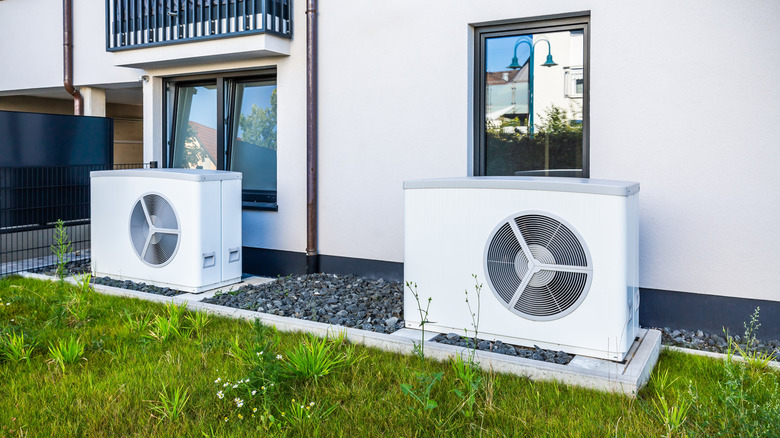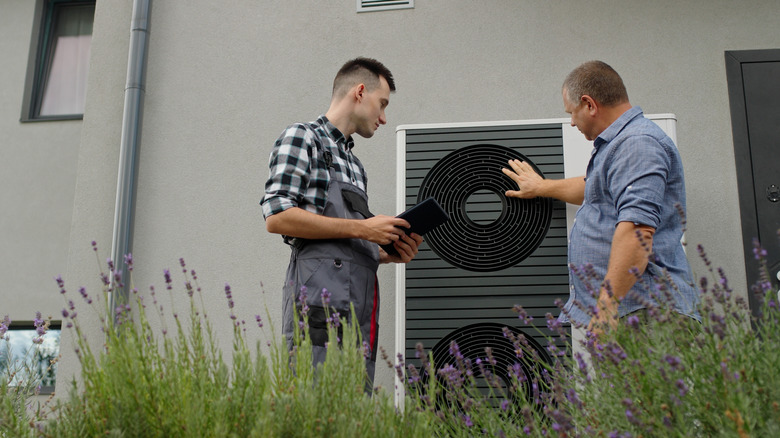Consumer Reports Data Shows These Are The 2 Best Heat Pump Brands Of 2025 So Far
Heat pumps are now America's most popular heating appliance to install, with over 5 million new units sold in the U.S. in 2024 — 21% more than gas furnaces in second place. HGTV's Mike Holmes considers installing a heat pump a great idea. Because of their high level of efficiency, heat pumps can cut Americans' energy bills by $300 to $650 a year. In a booming market, however, some heat pump brands are better than others.
It pays to shop around. Even though you can save money in the long run, installing a heat pump generally costs more than a gas furnace, so you don't want to waste money on an unreliable option. Which brands are the most reliable? Consumer Reports survey its heat pump-owning members, who rated 29 different brands, including some of the most popular. Among the eight brands that received exceptional ratings, American Standard and Trane received the absolute highest reviews.
American Standard and Trane both received a top score of 84%, far above the competition, even though five other brands (Airease, Allied, Armstrong, Concord, and Ducane) received higher scores for reliability. The survey only asked about these two factors, however, rather than broader questions such as cost and efficiency. The surveys were conducted in 2021 and 2023 and covered installations from 2007 and 2023.
Heat pumps have improved tremendously in the past decade in response to rising consumer demand, so the owner of a heat pump installed in 2007 might have a very different level of satisfaction than the owner of a newer model. Advances in the technology mean that heat pumps on the market today can work efficiently even in the extreme cold, even at temperatures as cold as -22 degrees Fahrenheit.
Finding the best heat pump for your home
Because Consumer Reports does not test or recommend specific heat pump models, you'll need to consider cost and efficiency factors on your own. The two factors are related — the higher the efficiency a heat pump is, the lower your electricity bill. For efficiency, turn to Energy Star's ratings.
Without getting too technical, American Standard and Trane, as well as the other brands mentioned above, all manufacture Energy Star-certified heat pumps that have heating efficiency ratings, or HSPF2, above 7.8. But since heat pumps double as air conditioners — something that a furnace can't do — look at their cooling efficiency as well. American Standard and Trane's heat pumps have Energy Star cooling ratings, or SEER2, above 11.7.
When it comes to cost, look for ductless heat pumps (also known as mini-splits), as they are the easiest to install. They don't require the expensive construction work that's involved in installing ducts to distribute the heat throughout a home, or the underground piping of a ground-source heat pump. Whichever type you choose, consult with a professional installer. Heat pumps only deliver heat through strategically located indoor units, which may require some expertise in allowing you to distribute heat throughout the entirety of your home.
Look for an installer who is Energy Skilled, a certification issued by the U.S. Department of Energy. Using a professional will cost you more, but with it comes the piece of mind of getting the most heat and cooling for your investment, which can pay for itself over time. If you want to save money on your installation, do it soon: Homeowners who install heat pumps on or before December 31, 2025 may qualify for up to $2,000 in tax credits, according to the IRS.

